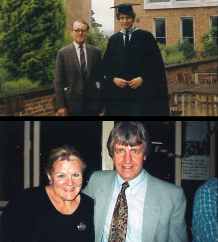
Howard and his father at graduation in June 1968 (top), and Howard and Viola in 2006 (bottom).
The legacy of Exeter
Howard Woodhouse (Philosophy, 1968) is Professor in the Department of Educational Foundations and Founding Co-Director of the University of Saskatchewan Process Philosophy Research Unit, Saskatoon, Canada. He shares his experiences of studying at Exeter in this blog.
In January 1965, I was interviewed by two faculty members at the University of Exeter. Having applied for a combined honours degree in English and Philosophy, they asked me questions both literary and philosophical and my answers seemed to satisfy them. Interviews were used in addition to A Level results to screen candidates at that time.
After the interview, I crossed the campus with its rolling hills and elegant buildings overlooking the Exe Valley. A sense of freedom pervaded my psyche, partly due to the beauty of the surroundings but more significantly because of the intellectual discussion I had just experienced. An appreciation of the adventure of ideas has remained with me to this day.
A few weeks later, I learned I had been admitted to the University, the first person in my family to do so. In October, I arrived at my new home, Brendan Hall, which was still under construction. It was not long before a group of us “Freshers” began to hang out together, eating at the Birks cafeteria, going to dances, trudging up the steep hill to lectures, and drinking coffee in different peoples’ rooms. Even then I realized how lucky I was to spend the first year in a community like this.
At the end of the first term, I dropped English literature to focus on philosophy, which I found difficult but interesting. Although I failed my first logic test, I passed the final exam with 92%, thanks to the guidance of Professor D.J. O’Connor. In addition to lectures, there were weekly tutorials with Dr. Betty Powell, a Mancunian who was so demanding that we were all afraid not to do the reading. And Dr. Geoffrey Keene led a seminar in which we had to write logical, coherent essays about recent philosophical literature. These and other talented teachers provided me with an understanding of the importance of philosophy for which I am grateful.
The music of the 60s was also a key part of my education. Most of the major bands played at university dances, and when Cream played one of their first gigs I watched Eric Clapton up close, marveling at his prowess. I interviewed folk-blues guitarist Bert Jansch for The Westerner when he performed at the annual folk festival, and during my third year I ran a folk club together with a friend in the Bradninch cafeteria in the old Law building downtown. Many talented students played at the club on those Sunday evenings.
I had applied to do a Master’s degree in philosophy at McMaster University in Canada, and was fortunate enough to get an upper second degree from Exeter, which enabled me to go. My plan was to stay for a couple of years, study for a Master’s, travel around North America, and return to the UK. It didn’t happen that way, for as John Lennon once put it: “Life is what happens when you’re busy making other plans.”
McMaster is situated in Hamilton, Ontario, a rather ugly steel city, a complete contrast to Exeter. However, the campus was pretty, there were quite a few international students, and the professors were challenging. When I finished my Master’s, I chose to do a Ph.D. in History and Philosophy of Education at the University of Toronto, mainly because of the interesting programme and because I thought it might lead to a job.
In the mid-1970s, when still writing my dissertation on Bertrand Russell I was able to find a two-year appointment at McGill University in Montreal, and following this another position at the University of Western Ontario. When I finally finished the Ph.D., I changed course and went to Nigeria to teach at the new University of Calabar situated in the south-east of the country.
I had wanted to teach in a developing country, and Nigeria was enjoying an oil boom in 1980 with plenty of money for higher education. Teaching in the Faculty of Education was a joy, because the students wanted desperately to learn even though the conditions were not the best. I learned a good deal from my Nigerian colleagues many of whom were excellent, and I played football for the University’s senior staff team - the only ex-pat to do so.
After returning to Canada, in 1985 I married Viola who had left Czechoslovakia after the Soviet invasion. Four years later, I managed to secure a tenure track position at the University of Saskatchewan, a large “research intensive” university in the Canadian prairies. Viola worked initially in the health care system and then secured a position teaching philosophy at the same university.
During this time, I published widely and my book, Selling Out: Academic Freedom and the Corporate Market was well received and earned interviews in several newspapers, including The Times Higher. The move from Ontario, where we had been living, has been a good one for both of us and we continue to enjoy a life together that has many pleasures.
Looking back, I realise that the University of Exeter provided me with the kind of education that opened my mind to new experiences and gave me the confidence to learn from them. Even though I spent 15 years as a “gypsy academic” moving from one institution and country to another, I maintained a belief in the possibility of more permanent employment. My one regret is that I have lost contact with friends along the way, including many of those from my undergraduate years.
Date: 29 June 2017
